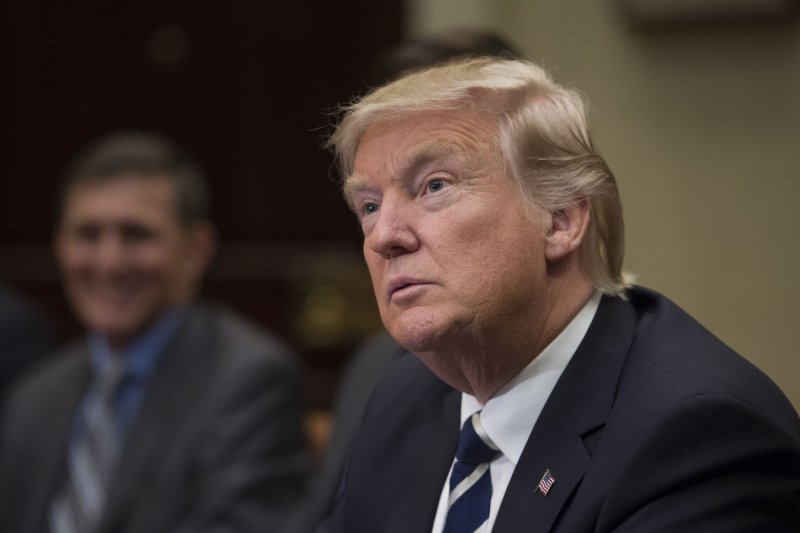1 of 2 | President Donald Trump listens during a meeting with cyber security experts in the Roosevelt Room of the White House on January 31, 2017. Friday, he said he's thinking of splitting the unit from the National Security Agency. File Photo by Molly Riley/UPI |
License Photo
Aug. 18 (UPI) -- President Donald Trump on Friday announced the elevation of U.S. Cyber Command to full combatant command -- and said he's considering removing the unit from the National Security Agency.
"This new Unified Combatant Command will strengthen our cyberspace operations and create more opportunities to improve our nation's defense," Trump said in a statement. "The elevation of United States Cyber Command demonstrates our increased resolve against cyberspace threats and will help reassure our allies and partners and deter our adversaries."
The elevation will streamline and prioritize the cyber operation, he added.
"United States Cyber Command's elevation will also help streamline command and control of time-sensitive cyberspace operations by consolidating them under a single commander with authorities commensurate with the importance of such operations Elevation will also ensure that critical cyberspace operations are adequately funded."
Trump said he's directed Defense Secretary James Mattis to decide whether to split the unit, known as Cybercom, from the NSA.
"He will announce recommendations on this matter at a later date," the president said.
NBC News reported that Mattis has a 60-day deadline.
Since 2014, NSA chief Adm. Mike Rogers has directed Cybercom. It was established in 2009 under the leadership of U.S. Strategic Command.
Assistant Secretary of Defense for Homeland Defense and Global Security Ken Rapuano told reporters at the Pentagon Friday that the split would only occur if it does not negatively affect capabilities.
"We need to meet the requirement of section 1642 which stipulates essentially that the mission capabilities of Cyber Command and the National Security Agency cannot be negatively impacted by the separation," Rapuano said. Section 1642 is part of the 2017 National Defense Authorization Act.
He added that no timeline has been set and a nominee for the new command would require confirmation by the Senate.
"The president has directed the Secretary of Defense to recommend a flag or general officer as the nominee for the president's decision to be confirmed by the Senate," Rapuano said.
"On confirmation by the Senate, that will be the new Unified Commandant Commander. The decision on that individual is with the secretary right now and has not been made yet."
Before leaving office, former President Barack Obama also said the dual arrangement should be split up.
"The two organizations should have separate leaders who are able to devote themselves to each organization's respective mission and responsibilities, but should continue to leverage the shared capabilities and synergies developed under the dual-hat arrangement," Obama wrote.
The NSA, founded in 1952, is tasked with protecting the government's classified networks -- but it is perhaps best known for spying on overseas targets to gather intelligence on adversaries and foreign governments.
Cybercom's mission is different in that it disrupts and destroys adversaries' networks against incoming threats to critical systems, including the U.S. military's computers.















